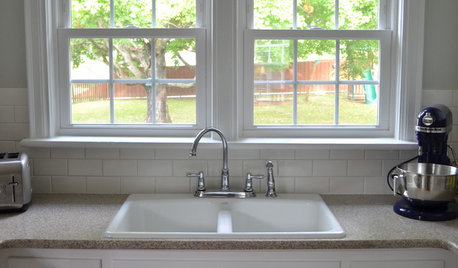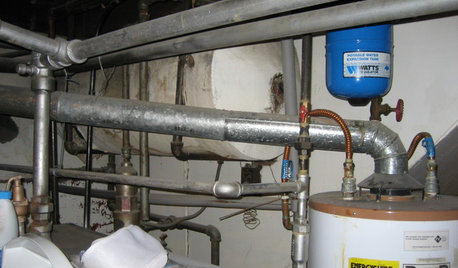dishwasher sparked during install--ruined circuit?
talley_sue_nyc
12 years ago
Related Stories

KITCHEN BACKSPLASHESHow to Install a Tile Backsplash
If you've got a steady hand, a few easy-to-find supplies and patience, you can install a tile backsplash in a kitchen or bathroom
Full Story
HOUSEKEEPING10 Chores You Can Whip Through During Commercials
Use ad time for getting tasks done, and it’s like fast-forwarding your house into cleanliness
Full Story
GREEN BUILDINGGoing Solar at Home: Solar Panel Basics
Save money on electricity and reduce your carbon footprint by installing photovoltaic panels. This guide will help you get started
Full Story
REMODELING GUIDESGet Stone and Ceramic Surfaces Super Clean
Keep your kitchen or bathroom looking as good as on installation day with the right cleaning methods for counters and tiles
Full Story
WINDOW TREATMENTSA Surefire Way to Prevent Sun Damage Indoors
Why let light ruin your furniture, floors and artwork, when the solution could be as simple as applying high-quality window film?
Full Story
FLOORS8 Ways Colored Floors Can Boost Your Design
Deep colors add height, white creates calm, and warm hues spark energy. Learn more ways to use floor color to enhance your home
Full Story
HOUSEKEEPINGHow to Clean Your Range and Oven
Experts serve up advice on caring for these kitchen appliances, which work extra hard during the holidays
Full Story
REMODELING GUIDES7 Bad Things Your Home May Be Hiding
What you don't know about your home could cost you during a remodel. Here's what to plan for
Full Story
KITCHEN DESIGNKitchen of the Week: Past Lives Peek Through a New Kentucky Kitchen
Converted during Prohibition, this Louisville home has a history — and its share of secrets. See how the renovated kitchen makes use of them
Full Story
SMALL KITCHENSThe 100-Square-Foot Kitchen: One Woman’s $4,500 DIY Crusade
Teaching herself how to remodel, Allison Macdonald adds function, smarter storage and snazzier materials
Full Story






brickeyee
talley_sue_nycOriginal Author
Related Professionals
Abington General Contractors · Centereach General Contractors · Elgin General Contractors · Hermitage General Contractors · Mountlake Terrace General Contractors · Perrysburg General Contractors · Summit General Contractors · Waimalu General Contractors · Eastvale Solar Energy Systems · Emeryville Solar Energy Systems · Titusville Solar Energy Systems · Selma Solar Energy Systems · Melville Solar Energy Systems · Lakeway Home Automation & Home Media · Pittsburgh Home Automation & Home Mediabus_driver
hendricus
talley_sue_nycOriginal Author
westom
brickeyee
talley_sue_nycOriginal Author
don_1_2006
brickeyee
weedmeister
Billl
talley_sue_nycOriginal Author
brickeyee
Billl
brickeyee
Billl
bus_driver
brickeyee
weedmeister
Billl
talley_sue_nycOriginal Author
bus_driver
brickeyee
talley_sue_nycOriginal Author
bus_driver
spencer_electrician
talley_sue_nycOriginal Author
talley_sue_nycOriginal Author
Billl
brickeyee
talley_sue_nycOriginal Author
brickeyee
Billl
weedmeister
brickeyee
Billl
kurto
brickeyee
spencer_electrician
ionized_gw
bus_driver
ionized_gw
Billl
brickeyee
bus_driver
brickeyee
westom
ionized_gw
brickeyee